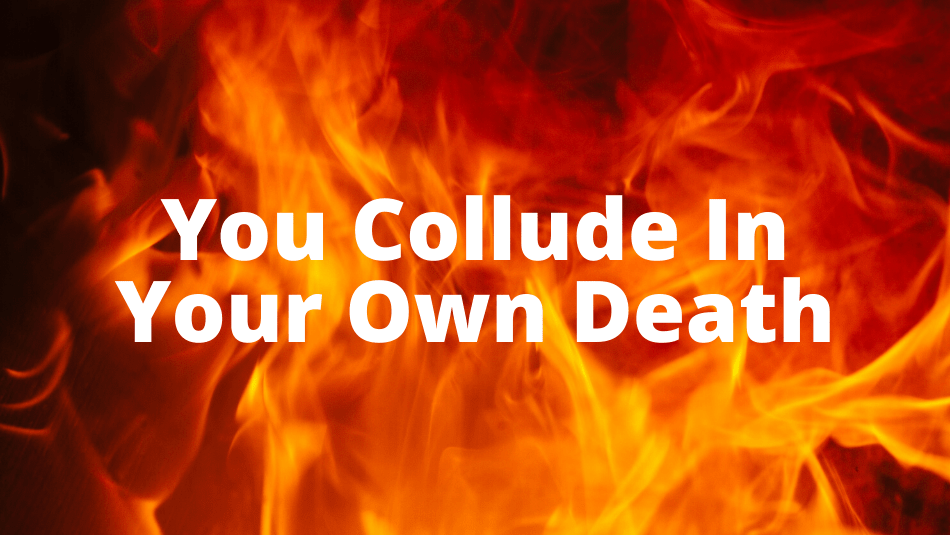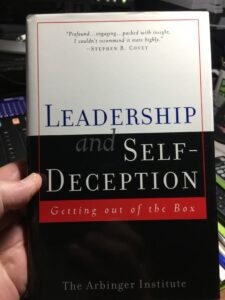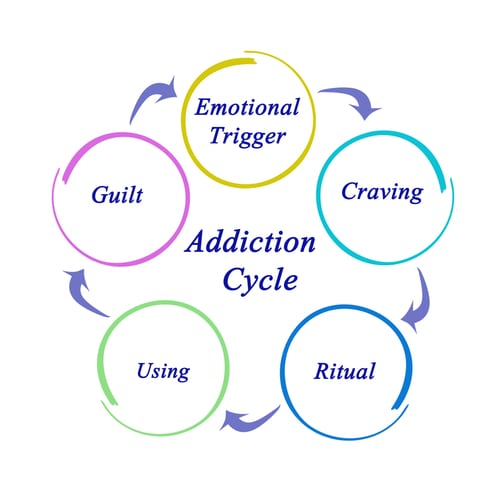You Have To Be Totally Tired Of Who You Are (Season 2020, Episode 15)
Podcast: Play in new window | Download (Duration: 39:41 — 36.3MB)
Subscribe: Apple Podcasts | Spotify | iHeartRadio | Email | RSS | More
He lost 75 pounds in 3-1/2 months. He admits it wasn’t likely the ideal way to do it or the ideal timeframe. But he was sick and tired of being sick and tired. Here’s what he did:
1. Gave up soda and sugar
2. Ate oatmeal every morning
3. He ate grill chicken every day and premade enough for the week, his only veggie was broccoli
4. When he got too tired of chicken he ate eggs instead
5. He ate special k bars for sweet cravings (high glycemic but it worked for him)
6. He did eat fruit but his overall calories were under 1500 calories a day
7. He was hungry at night so he would go to bed early
8. He avoided dairy and went to almond milk
9. He did not go to the gym but he did walk and run
I saw his video about a year ago and for some reason, it popped up in my YouTube feed again so I watched it again. He’s just a good ‘ol boy trying to get better. The minute he said it, I instantly remembered watching this a year ago – because it’s such a true statement.
Lots of folks who are smarter than me had said it. We all know it’s true. In our own lives. In the lives of others.
“We change our behavior when the pain of staying the same becomes greater than the pain of changing. Consequences give us the pain that motivates us to change.” – Dr. Henry Cloud
Our slimmed-down country boy says it in a way I can completely understand.
“You have to be totally tired of who you are.”
Why would I be totally tired of who I am?
Let me count the ways. 😉
Self-awareness is the ability to see yourself clearly and objectively through reflection and introspection.
That’s how an article at PositivePsychology.com begins. The title of the article is, “What Is Self-Awareness and Why Is It Important? [+5 Ways to Increase It].”
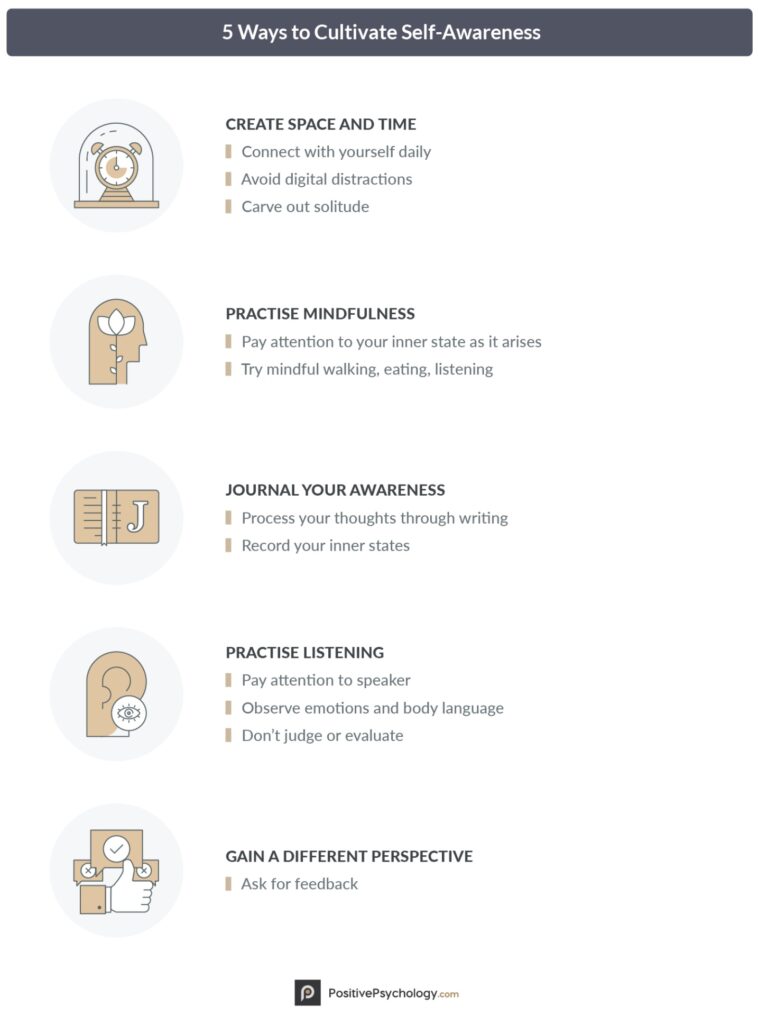
Social media is overrun with people disparaging the opinions or viewpoints of others when it comes to YOUR life. It goes well beyond the seemingly wise admonition to ignore the haters. It presupposes that everybody has the ability and desire to see themselves accurately and that each of us is able to do that without any help. It also foolishly holds that none of us benefits from listening to others.
The truth is we all struggle to accurately see ourselves or to face the realities of ourselves. We likely lean toward thinking too highly of ourselves, or too lowly. It’s too easy for us to overestimate or underestimate ourselves. Accuracy is difficult. Others can help provide just enough perspective where we’re able to more accurately see ourselves. If we choose to ignore their help, it hinders us. We need the insights, experiences, and observations that others can provide.
But not just anybody can do that for us.
Those with whom we’re fully safe serve us best. These are the people who only want our best. They have no other agenda. They don’t want to live our lives for us. They don’t want to make our choices for us. They simply want us to do the right thing by helping us make the wisest choice that will help us be our best. They love us enough to challenge us, nudge us, push us, question us, support us, and do whatever else they can to help us move forward. If we choose to ignore or banish these people, we do so at our own peril.
Self-awareness is not a solo pursuit. It demands we make wise choices in who surrounds us.
That’s a critical component to succeed in growing tired of who we are when who we are has become destructive or detrimental to being our best.
Recently we learned that a business hero to many – Tony Hsieh, founder of Zappo’s – was living a life most of us knew nothing about. Virtually every major news publication, including the Wall Street Journal, has written pieces that reveal Hsieh had a serious drug addiction. According to multiple accounts, he banished those who attempted to help him correct his poor behavior, choosing instead to surround himself with people who would support anything he chose to do – common behavior for drug addicts. Sadly, Hsieh’s story ended as so many do…with his death.
During this pandemic, there have been a number of other sad stories where people have died at their own hands. Mental health is, thankfully, gaining more and more attention as we’ve seen too many people fall into depression and despair. I’m certainly not able, or willing, to pass judgment on people in such cases and I only use them to make the point that self-awareness and improvement demand a degree of being tired of the status quo – but it also requires a clear enough mind (free of drug abuse and addiction and also free of mental illness) to face, in the most healthy way possible, the pain of our present state. Enough pain to compel us to consider making different – aka *better* – choices!
The pandemic and the Presidential election have both proven how valid this is. As Psychology Today says, “The Dunning-Kruger effect is a cognitive bias in which people wrongly overestimate their knowledge or ability in a specific area. This tends to occur because a lack of self-awareness prevents them from accurately assessing their own skills.”
Last year Jeff Haden, one of my favorite Inc. contributors wrote an article entitled, Here’s How to Tell Within 5 Minutes If Someone Isn’t as Smart as They Think.
Writes Jeff…
That’s because wisdom isn’t found in certainty. Wisdom is knowing that while you might know a lot, there’s also a lot you don’t know. Wisdom is trying to find out what is right rather than trying to be right. Wisdom is realizing when you’re wrong, and backing down graciously.
Some are certain the pandemic is a hoax. Others are certain if they contract COVID 19 they’ll die.
Some are certain Donald Trump won the election. Others are certain he’s the worst thing to happen to humanity since Adolf Hitler.
Now, some are certain the COVID 19 vaccine is going to a lifesaver. Others are positive that their family will never take the vaccine.
It seems we’ve leaned further and further away from wisdom and more and more into being dead sure that we’re right. Even though certainty goes from one extreme to the other, rarely are we pausing long enough to wonder, “If both extremes are certain, does that mean both are right? Might both be wrong?”
How can such a wide gap exist in certainty?
The Dunning-Kruger Effect. That’s how. And it’s not about being confident. Or sure about things. It’s about being open enough to consider things before you reach certainty. It’s about embracing questions – or at least not resenting questions – as you navigate your decisions, choices, and actions.
Truth will withstand tough scrutiny. So will wisdom.
Defiance is another enemy of growth and self-improvement.
Our stubborn refusal to listen, question, discuss, consider, and think don’t serve us well. Defiance is our stubbornness fueled by anger. Or bitterness. Or some other negative emotion.
Defiance isn’t the fuel for self-improvement. Or wisdom. It’s destructive.
So how does pain serve us? The pain of facing the reality that we’re now unhappy with ourselves?
Lately, I’ve been looking more deeply into heart issues. Not cardiac stuff, but spiritual stuff. The Bible-view of our heart, our mind. That place where we reason things, believe things, ignore things, disbelieve things. That place from which flows who we are, which is based on what we choose to do.
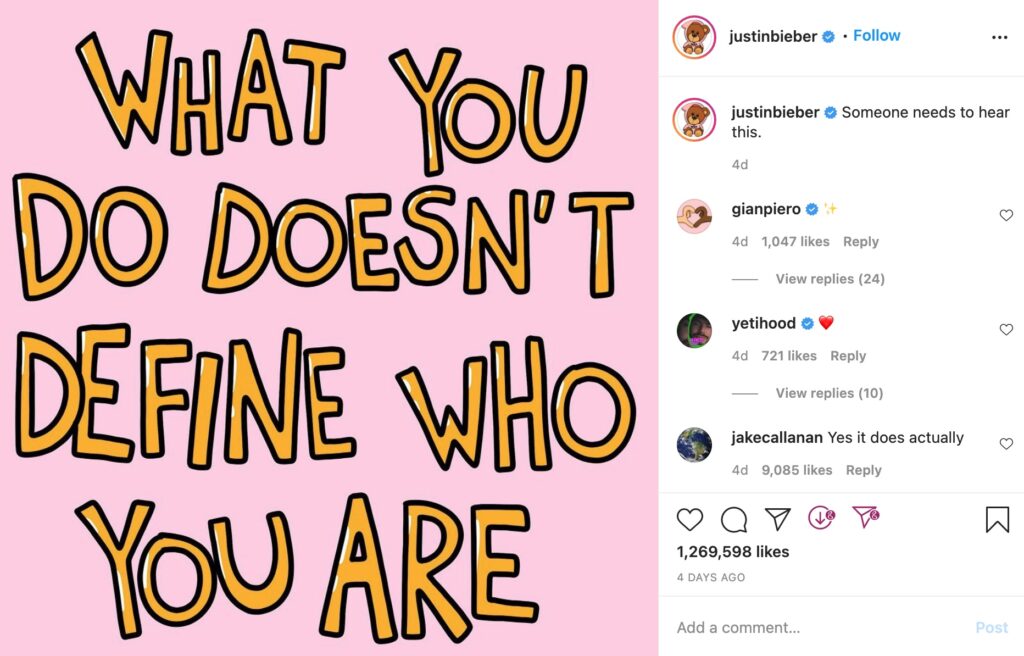
The Biebs posted this over at Instagram just a few days ago, “What you do doesn’t define who you are.” I share what commenter Jake Callanan said, “Yes it does actually.”
If what you do doesn’t define who you are, then what does?
There’s a sermon in the Bible delivered by Jesus. Even non-Bible readers know about the Sermon on the Mount.
Matt. 13:1-9, 18-23 “On that day went Jesus out of the house, and sat by the sea side. And there were gathered unto him great multitudes, so that he entered into a boat, and sat; and all the multitude stood on the beach. And he spake to them many things in parables, saying, Behold, the sower went forth to sow; and as he sowed, some seeds fell by the way side, and the birds came and devoured them: and others fell upon the rocky places, where they had not much earth: and straightway they sprang up, because they had no deepness of earth: and when the sun was risen, they were scorched; and because they had no root, they withered away. And others fell upon the thorns; and the thorns grew up and choked them: and others fell upon the good ground, and yielded fruit, some a hundredfold, some sixty, some thirty. He that hath ears, let him hear.”
“Hear then ye the parable of the sower. When any one heareth the word of the kingdom, and understandeth it not, then cometh the evil one, and snatcheth away that which hath been sown in his heart. This is he that was sown by the way side. And he that was sown upon the rocky places, this is he that heareth the word, and straightway with joy receiveth it; yet hath he not root in himself, but endureth for a while; and when tribulation or persecution ariseth because of the word, straightway he stumbleth. And he that was sown among the thorns, this is he that heareth the word; and the care of the world, and the deceitfulness of riches, choke the word, and he becometh unfruitful. And he that was sown upon the good ground, this is he that heareth the word, and understandeth it; who verily beareth fruit, and bringeth forth, some a hundredfold, some sixty, some thirty.”
This matters because it determines whether or not we become tired of who we are – when what we are isn’t good. Not all hearts – or minds – are the same. Not all of them are good, or wise enough to recognize the need for a change. Some people lack self-awareness, wisdom, or sobriety. And it may be due to their own self-will and defiance. Or it could be due to mental illness or substance abuse. There is a reason it’s so difficult to convince people who abuse substances or who suffer a mental illness that they need help.
So many among us are roaming about aimlessly lost in drug use and/or mental illness that they simply are unable to see themselves in the nose-dive that’s apparent to the sober people observing their lives. Like the drunk who thinks he’s perfectly capable of driving safely, they suffer delusions. Their detachment from truth and reality has skewed their ability to get tired of who they are. The result? They lack the desire to make a change that just might save their life.
I’ve yet to see anybody who harbored bitterness and defiance ever reach the positive place required to be totally tired of who they are in order to grow, change, and improve. Growth, self-improvement, and improved wisdom demand a humility that only sober people can fully embrace. Defiant, bitter, and angry people tend to spend more time thinking they’ve been victimized by others. The line of people who have suffered wrong forms to the left. We’re all in that line. Humility affords us the opportunity to escape that line so we can busy ourselves making changes that will make us better.
Let’s talk about these pronouns. YOU have to be totally tired of who YOU are.
This isn’t about you being totally tired of who somebody is.
Well, you can be tired of somebody’s poor, foolish, or self-destructive behavior, but it won’t do you or them much good.
So it’s best to just sit down, hold that mirror in front of your face and look intently to see yourself as you really are. That’s the hard part – seeing yourself as you really are. This is where we all have to leverage the power of others. We need people in our life who care so deeply about us they’re willing to tell us what we need to hear. Willing to teach us what we need to learn. Willing to serve us no matter what. All because they have our best interest at heart. Not for any other reason.
That’s who the safe people are. People who can help us figure out if we are or should be totally tired of who we are.
Then there are the unsafe people – like the ones who made fun of the guy who lost all the weight. By making jokes about how he looked pregnant, it got him to see something. Of course, he already knew he needed to drop some weight. Their comments didn’t give him a sudden flash of insight, but they did serve to inspire him. Maybe it was an “I’ll-show-you” kind of inspiration. Whatever it was, he described it as provoking him to instantly be totally tired of who he was…so he set about to change. He made up his mind to do something about his weight. Nobody else could do it for him.
He could have made a different choice.
Anger. Resentment. Bitterness. Defiance. Sadness. Depression. Blame. He could have hugged it out with any or all of those when those co-workers poked fun at him.
Instead, he chose to face what he already knew was true. As he says in his video, he knew they were right. He didn’t blame them. He opted to blame himself for letting himself get so out of shape. Accepting responsibility for his current state helped him accept responsibility for changing it. When others could have hidden behind resentment, he chose to step forward, taking on the challenge to control his own destiny by doing something about it.
His refusal to just accept his current state as some new norm prompted him to chase improvement.
We have those same choices. All of us.
No matter what our current problems may be. Weight. Career. Fitness. Money. Relationships. Plugin whatever ails you and it’ll fit. Accept your current state and continue down a negative or destructive path. Or, accept that your current state can be changed if you’re willing to take matters into your own hands. He’s right – until we’re sick and tired of being sick and tired, we’ll continue to remain sick and tired.
The Dr. Cloud quote needs to be emblazoned in our mind…
“We change our behavior when the pain of staying the same becomes greater than the pain of changing. Consequences give us the pain that motivates us to change.” – Dr. Henry Cloud
Pain. Let’s wrap this up thinking about the pain because that’s the impetus for this change – growth and improvement. If there is no pain, we’re not likely going to change anything. Of course, millions of people are blocking out the pain with drugs, alcohol and all kinds of illicit and immoral behavior in hopes they can keep running from their pain. But like a shadow that follows them everywhere they go, they can’t outrun the pain. Sadly, they wind up making the pain worse and worse. Wasted lives. Horrific lives that serve no positive purpose in their own life or in the lives of others.
The Bible calls it the “root of bitterness.” It’s how many people opt to feel about their own need to grow, improve – to change! They hate those who try to help them. They hate even more those who aren’t trying to help but to hurt (like the co-workers making fun of the guy’s weight). They’re totally tired of others, not their own shortcomings, or failings, or weaknesses. They focus more on what others “do” to them instead of focusing on what they can do for themselves. Their pronouns are them and they, not me. The irony is that by refusing to focus on their own need for growth, improvement, and change they’re behaving with colossal selfishness.
Are you in touch with your pain? The pain of something you know you can change if you’ll just make up your mind?
Are you blaming that pain on others who really aren’t responsible for your situation, but you’d like to think they are?
Are you deflecting that pain away from your own responsibility in order to stop feeling so badly? Are you searching for solace in feeling like a victim?
Perhaps you’re tired of being the victim and you’re totally tired of who you are as a victim. Lean hard into that pain so it can fuel your desire to at long last do something about it.
Others may have their own desires for your best but until you want it for yourself, nothing matters! First, you must do it for yourself because it’s your life. You alone will answer for the life you’ve lived. What others have done to you, or for you will not excuse you from facing the reality of your own choices, behaviors, words, and actions.
Permit me to leave you with a few tips that might be helpful.
Step One
Be thankful. Be exhaustive in your attempts to be thankful. See how many things you can list or name. When you think you’ve reached the end, keep going. Figure out what else you have to be thankful for. Make sure people are your first thought.
Step Two
Now focus your gratitude on the present opportunities. Keep on going with your thanksgiving, but now focus it on the chances, happy accidents, people, and circumstances that afford you the opportunities to at long last do something about those things you need to fix or repair.
Step Three
Figure out the answer to, “What’s next?” Don’t fret about getting too far ahead of yourself. Just figure out the first step. What will you do to get yourself on the right path toward self-improvement, growth, and change?
Ask those famous journalist’s questions:
Who? What? When? Where? Why? How?
Apply those questions to the first step. Just the first step!
Step Four
Get busy with that first step. Start. Don’t delay. Don’t talk yourself into waiting.
You will not make matters worse by taking that first step. Any movement in the right direction will help. The sooner you take the step, the sooner you get on the path toward growth. The key to getting unstuck is to MOVE.
Step Five
Be very aware of how it’s working and adjust. This is why it’s unimportant that you have every “i” dotted or “t” crossed. No worry about it being just right, or perfect. It just has to be good enough to give you clarity of what you’re going to do first. After you take that first step, pay attention to how it’s working, and make adjustments.
Step Six
Don’t quit. Keep going with the intent of improving just a little bit each day. Embrace the process of daily improvement. Quit thinking about what you’re giving up and instead, think about what you’re gaining. One day at a time. Remember that adage about how you eat an elephant – “one bite at a time.” Small steps compounded over time make BIG IMPROVEMENTS.
Step Seven
Remember, the end result – the goal – is the reward for the work so stay focused on enjoying the process, the work!
And don’t forget the pain that you’re ridding yourself of. It’s important to remember what we’re running from as we focus on what we’re running toward. It’s that “this is better than that” kind of thinking that will help us stay on course. We want to put THAT behind us so we can reach for THIS.
I hope that helps you in your battles.
And I hope you and your family have a safe and happy holiday season!

You Have To Be Totally Tired Of Who You Are (Season 2020, Episode 15) Read More »
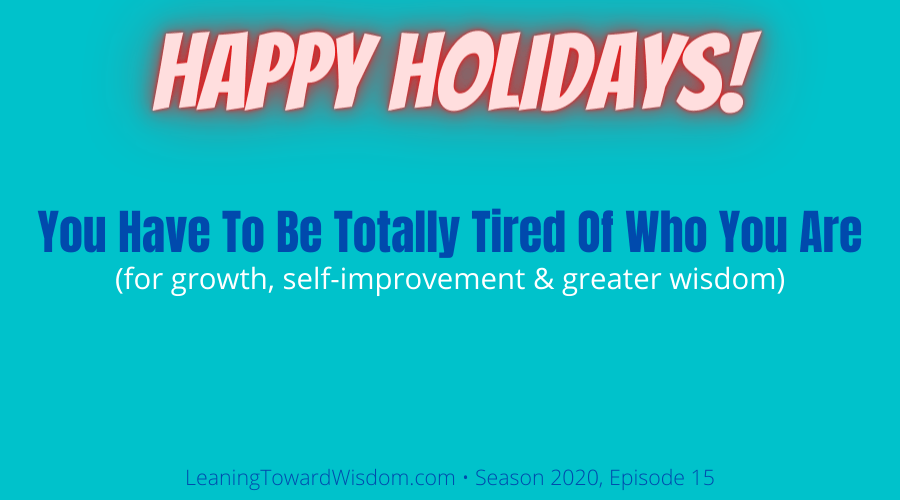
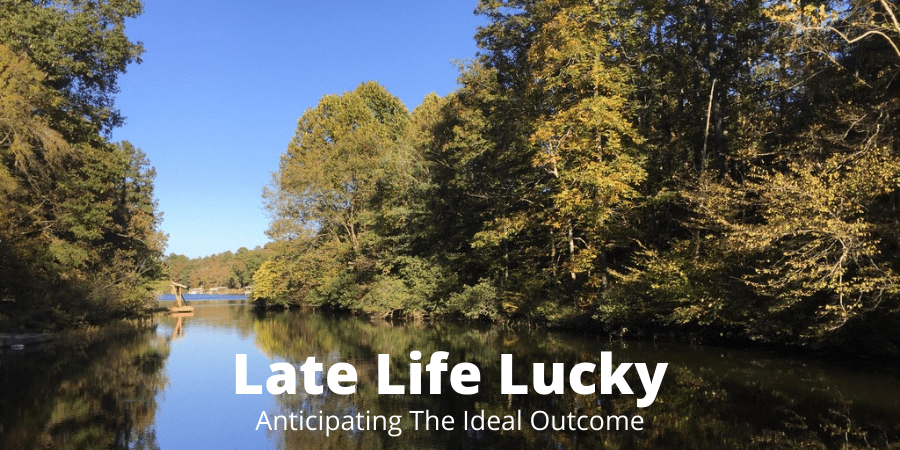
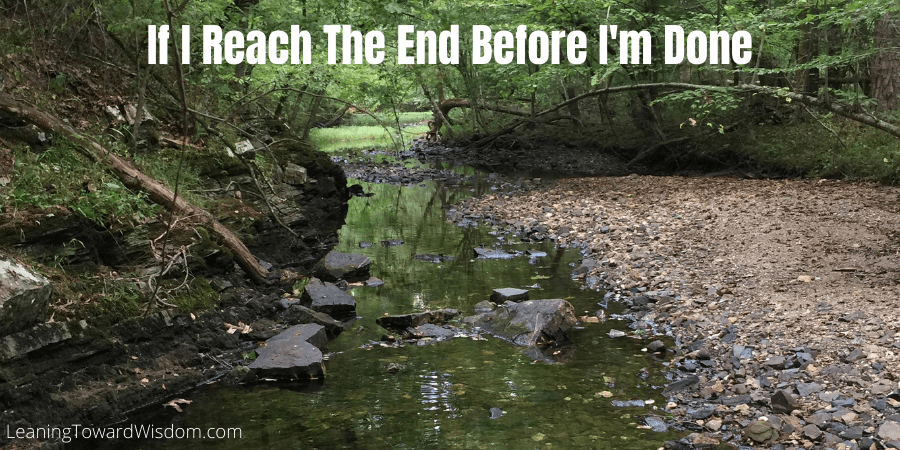


 I find myself getting excited in the morning to spot the rabbits, if only for moments. Catching them outside their micro-forest is a pretty good way to start a day. By the time I arrive near their home I’ve been walking 30 minutes or more. I’m only disappointed if somebody – usually somebody with dogs – has already passed by coming from the other direction. I know the rabbits won’t be out. They’ll have already scampered back into the brush for safety. I hate it when that happens. Thankfully, due to my early morning schedule, it doesn’t happen often, but once is too much. My disappointment is palatable when it does. It ruins the entire walk for me. Well, that an not finding any baseballs. But I love the rabbits way more than the baseballs.
I find myself getting excited in the morning to spot the rabbits, if only for moments. Catching them outside their micro-forest is a pretty good way to start a day. By the time I arrive near their home I’ve been walking 30 minutes or more. I’m only disappointed if somebody – usually somebody with dogs – has already passed by coming from the other direction. I know the rabbits won’t be out. They’ll have already scampered back into the brush for safety. I hate it when that happens. Thankfully, due to my early morning schedule, it doesn’t happen often, but once is too much. My disappointment is palatable when it does. It ruins the entire walk for me. Well, that an not finding any baseballs. But I love the rabbits way more than the baseballs. For new listeners, part of my walking route involves two baseball fields. As I walk the perimeter of the fields I find baseballs. Some days I don’t find any. On my record-setting day, I found 18. I now have a pretty big bag of them. Guestimation? Around 300.
For new listeners, part of my walking route involves two baseball fields. As I walk the perimeter of the fields I find baseballs. Some days I don’t find any. On my record-setting day, I found 18. I now have a pretty big bag of them. Guestimation? Around 300.

